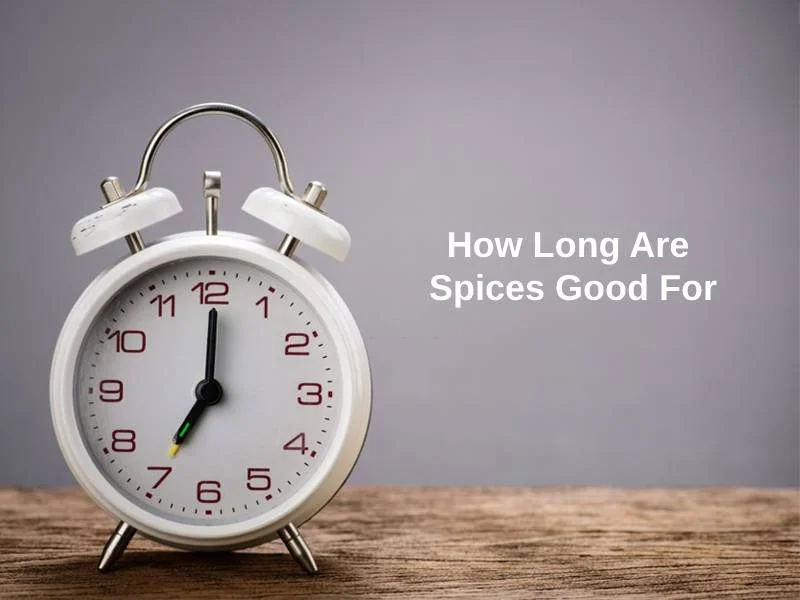Exact Answer: 1 – 4 Years
One of the most essential ingredients in adding flavor to food is undoubtedly spices. Any recipe would not be the same without adding spices to it. They are used so that sometimes people forget what an important position they have in a recipe.
Spices not only season the food but also prevents food from spoilage by adding a boost of color, flavor, taste, and certain health-promoting plant compounds to one’s dishes. One of the most common health-promoting plant compounds used as a spice is turmeric. It has many health benefits and is added to several recipes.
Several common examples of spices and herbs include cloves, turmeric, cinnamon, rosemary, oregano, basil, parsley, mint, powdered ginger, garlic powder, chili powder, ground cardamom, ground paprika, red chili flakes, coriander, mustard seeds, fennel seeds, nutmeg, cumin seeds, etc.

How Long Are Spices Good For?
The longevity of spices is difficult to determine as it depends on both the types of spice as well as the conditions under which it is stored. Spices do not get spoilt. But over time, spices lose their potency and does not flavor the food as it used to do when it was fresh and new. Thus, when spices are kept for too long, they might lose most of their potency, flavor, color but it will probably not make any person sick just by consuming it.
The use-by date also called best-by date, is printed on almost every store-bought spices which indicates the time frame over which the spices will retain their maximum flavor and quality.
Whole Spices stay fresh for about 4 years, ground spices stay good from about 2 – 3 years whereas dried herbs last for 1 – 3 years. Dried herbs and spices will last the longest when stored away from air, light, heat, and moisture.
Powdered spices can lose their freshness extremely quickly. They don’t last for too long. When these spices are crushed and there is no aroma, that is the clue to say goodbye to them. Whole spices can be used for a greater period, unlike ground or powdered spices. Whole spices can remain fine even up to 5 years if stored properly.
| Type of spices | Duration |
| Dried herbs (Examples. basil, oregano, thyme, parsley, bay leaves, etc) | 1 – 3 years |
| Ground or powdered spices (Examples. garlic powder, chili powder, ground cinnamon, ground cardamom, etc) | 2 – 3 years |
| Whole spices (Examples. coriander, mustard seeds, whole nutmeg, cumin seeds, etc) | 4 – 5 years |
Why Do Spices Stay Good For This Long?
Several variables are considered while determining the shelf life of herbs and spices. Some of those factors include the type of spices, their processing, their storage, and many other things. It is observed the more whole or less processed the spices are, the longer is the shelf life of such spices. In the same way, the more processed the spices are, the shorter will be its shell life.
Whole or unground spices have the longest shelf life as they are less processed and are mostly used in their natural form. Also, the surface area of such spices is less exposed to air, light, and moisture which allows them to preserve and retain their flavor, aromatic oils, and compounds longer than the spices that are ground or powdered.
One should remember that salt is an exception to the rule as it can stay good without spoiling or losing flavor for eternity when kept properly. However, if the salt is seasoned a bit and is not in the pure form, then it might not last indefinitely but will have a shelf life of about 4 – 5 years.
To keep spices fresh and flavorful for longer durations one should store spices in a dark and cool cupboard or compartment, away from direct heat or sunlight. It should always be kept tightly closed when not in use to prevent the build-up of moisture.
One must everywhen keep in mind that moisture can quickly degrade the flavor and texture of spices, making them susceptible to developing mold. When one notices any mold build-up in any of the spice containers, discard those immediately.
Conclusion
Spices play an important role in flavoring food. They help in bringing out the most delicious aroma and flavorful taste from almost every dish to which they are added. Spices technically don’t go bad but lose most of their flavor when kept unused for too long. The shelf-life of spices varies depending on the type of spice and how it is processed and stored.
Minimizing the exposure to extreme heat and storing the spices away from light, air, and moisture can help in lengthening the shelf-life of spices thereby helping in reducing wastage and saving money on buying new spices.